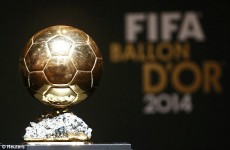
Created by Sporcle
Check out their website for more fascinating quizzes
Follow them on Twitter @sporcle
Like O-Posts on Facebook
You can also follow O-Posts on Twitter @OPosts
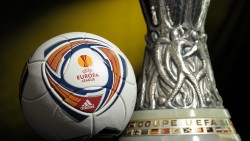
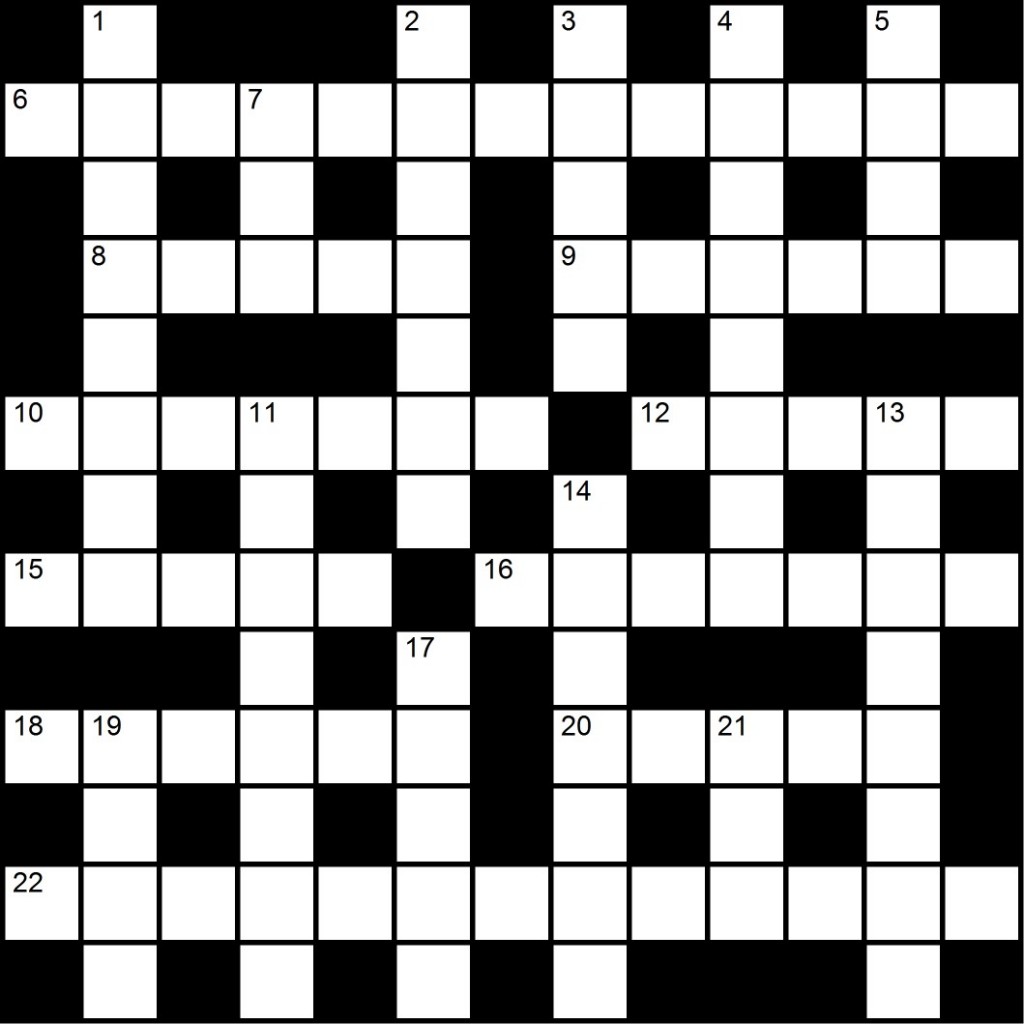
To celebrate Wednesday’s five-goal thriller between Dnipro and Sevilla, we’ve dedicated this week’s football crossword to the Europa League.
So if you think you know your Elfsborgs and your Esbjergs, come with us on another puzzle adventure!
Clues Across
6 Uruguayan striker who netted all 4 goals in Napoli’s 4-2 defeat of Dnipro in 2012 (7,6)
8 Two-goal hero for Sevilla on Wednesday night in the Europa League Final (5)
9 _ Stam, he’s made a handful of Europa League appearances for Standard Liege during the past 2 seasons (6)
10 Mr Distin, he played in 3 Europa League games for Everton this season (7)
12 Yann, France midfielder who played for Inter on loan in the Europa League earlier this season (5)
15 Went on the counter-attack, penniless? (5)
16 One way to describe an unwanted footballer (7)
18 Which Serie A side’s Europa League hopes ended in Kiev in this season’s semis? (6)
20 Turkey midfielder who scored a couple of key Europa League penalties for Dortmund in 2010 (5)
22 Which JP (now at PSG) was sent off in 2 of Palermo’s Europa League games in 2010? (6,7)
Clues Down
1 Against Lech Poznan in 2010, this Togo striker became the first Man City player to score a European hat-trick (8)
2 Europa League side Astra Giurgiu come from this country (7)
3 What both Sevilla and Benfica failed to do until the penalty shoot-out in the 2014 Europa League Final (5)
4 Serb defender whose last-minute header against Benfica won Chelsea the 2013 Europa League (8)
5 Mr Emery, he recently guided Sevilla to back-to-back Europa League titles (4)
7 _ Nijmegen, team that made it to the last 32 of the 2008/09 UEFA Cup (3)
11 _ Plzen, they reached the last 16 of the Europa League in both 2013 and 2014 (8)
13 _ Lopez, he scored a couple of Europa League goals at home for Lyon in 2012 (8)
14 Europa newcomers, FC Krasnodar play their domestic football in this league (7)
17 Albert, Spanish winger who scored for Espanyol in the 2007 UEFA Cup Final v Sevilla and went on to play for Liverpool (5)
19 Dutch team knocked out by Dnipro in March (4)
21 Team names are plucked out of it during each cup draw (3)
Answers to this week’s crossword puzzle will pop in a random article within the next few days or so. So be on the look out for ’em!
Created by Aleric Linden
Check out more of his work at Puzzle-House through his website
Like O-Posts on Facebook
You can also follow O-Posts on Twitter @OPosts
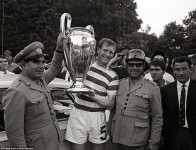
1955: Hibernian v Rot Weiss Essen
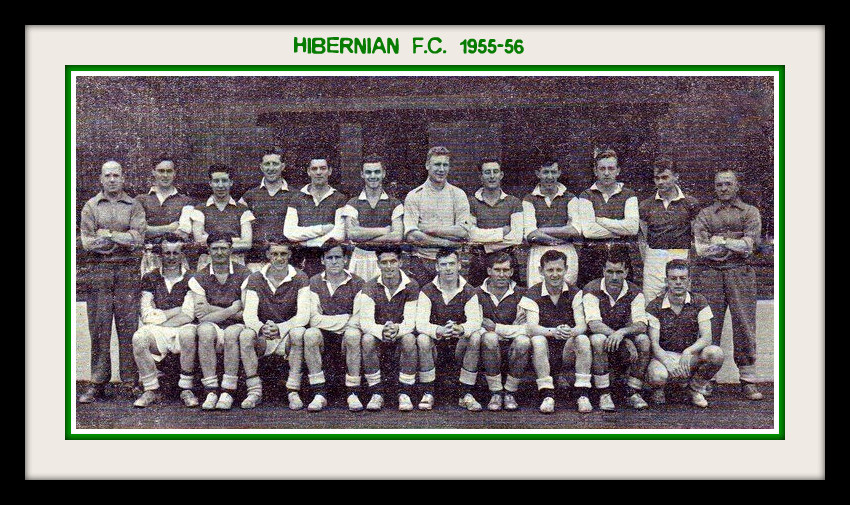
Edinburgh team Hibernian, known more popularly as Hibs, became the first British football club to compete in the European Cup. English sides declined to enter the inaugural contest, but there was more interest north of the border.
However, reigning Scottish Champions Aberdeen did not enter. Hibs were selected partly because of their reputation for flowing football, but more importantly due to the fact that they were one of a handful of British teams to then have floodlights; European matches were generally played in the evening.
The first round opponents were West German Champions Rot Weiss Essen. The Scots crushed the Germans 5-1 on aggregate. Their next opponents were Swedish club Djurgarden IF who they easily beat 4-1 over two legs.
Hibs’ run finally came to an end in the semis against Reims who went on to lose the opening European Cup Final against Real Madrid. This would be Hibernian’s last foray into the competition, though they did claim the notable scalp of Barcelona in the 1960/61 Fairs Cup Final.
The following year Manchester United became the first team to represent the English League. They also progressed to the semi-finals, but were beaten by Real Madrid. British involvement in the fledgling European Cup was still beset by snobbery towards foreign football. During the 1950’s there was a growing realisation that England and Scotland were not the only powers in the World Football. Both countries had made disappointing debuts in the World Cup, and it was clear that they were falling behind the likes of Hungary, Uruguay, and Brazil.
For the first decade no UK club managed to reach the final. Hibs, Spurs, Dundee, and Liverpool all made the semis once, and Manchester United narrowly missed out on the final three times. Gradually clubs began to adapt to the differing style of Continental football, and it was Celtic who became the first to reach a European Cup final in 1967.
1967: Celtic v Inter Milan
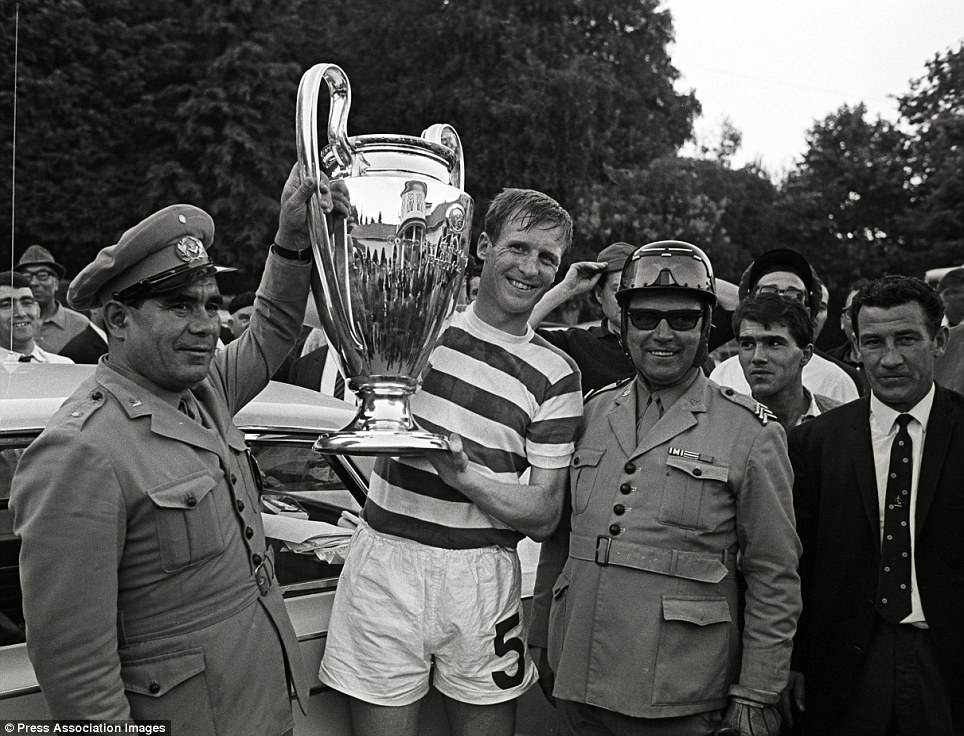
Celtic’s first ever run in the Cup, would prove to be their most successful. After beating Dukla Prague in the semis, Celtic faced Inter Milan. The Italians had knocked out reigning champions Real Madrid in the quarter-finals, and went into the final as strong favourites.
Inter played a typically Italian brand of defensive football, but the underdogs were quietly confident. Their manager Jock Stein had assembled a team of locals (every player was born within 30 miles of Parkhead), who knew each others’ games inside out. Although star striker Joe McBride was missing, Celtic still felt their attacking ethos could overturn even the most defensive of teams.
Just six minutes into the match, Inter were awarded a penalty, which Sandro Mazzola converted; it was their only shot on goal. The Glaswegians then had a seemingly fair goal disallowed by the referee, and two decent penalty calls turned down. Nevertheless Celtic refused to panic, and instead kept faith in their creative game.
Just after the hour-mark the Scots finally broke down the efficient Italian defence, with Tommy Gemmell blasting the ball through the keeper’s hands. Celtic continued to push forward, and Steve Chalmers grasped the winner six minutes from time, much to the delight of the Lisbon crowd who had been won over by Celtic’s beautiful.
The Scottish side became the first team from Northern Europe to be crowned Champions of Europe, and the eleven players that day were immortalised as the ‘Lisbon Lions’.
1968: Manchester United v Benfica
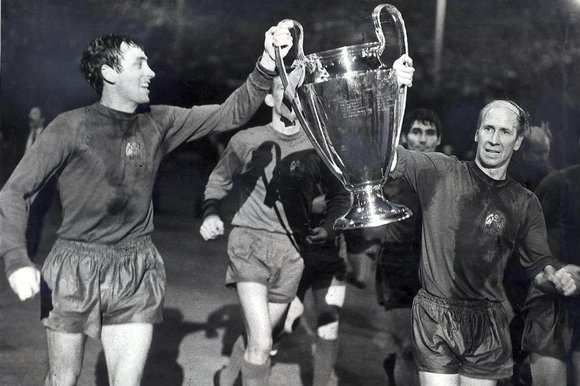
The year following Celtic’s triumph, Manchester United became the first English club to reach the European final. Man United did have the benefit of effectively playing at home, as the match was played at Wembley. It was a classic United starting eleven with such household names as George Best, Bobby Charlton, and Nobby Stiles on the team-sheet, though Dennis Law was injured.
The most famous player in the Benfica squad was Eusebio, the Black Panther, who had so impressed at the World Cup in England two years earlier. The Benfica team was made up entirely of Portuguese citizens, whilst United’s starting eleven was composed of players from the British Isles.
The first half passed largely without incident, but early in the second, Charlton put the Red Devils in front. Benfica scored as equaliser through Jaime Graca with twenty minutes to go, to set the Wembley crowd on edge.
During the first ninety minutes there was little between the two teams, yet once extra time began, Man United began to dominate. Charlton bagged another goal, before Best and Brian Kidd secured the cup for Man United. It had been a long journey for the Manchester club following the Munich Air Disaster a decade before.
Though ironically, having captured the European Cup, the club went into decline. The next quarter of a century would be one of consistent under-achievement.
1970: Celtic v Leeds

This was the first time the champions of England and Scotland had met in Europe. The media, on both sides of the border, hyped up the ‘Battle of Britain’. The English press seemed utterly convinced that Leeds would ease through the tie, despite Celtic’s European pedigree. However Don Revie’s men lost the opening leg at Elland Road nil-one through a first minute goal from George Connelly.
Celtic elected to play the corresponding fixture at Hampden Park, Scotland’s international stadium. Such was the interest that even thousands of supporters of Celtic’s arch-rivals Rangers bought tickets to cheer on the men in green and white. The extraordinary attendance of 136,505 remains a European club record, and since there is currently no stadium on the continent with a larger capacity, it will probably remain a record for the foreseeable future.
Leeds faced an uphill struggle, though their most expensive player, Allan Clarke, cost £165,000, over three times the paper value of the entire Celtic team. The Yorkshire team were clearly fired up for the match, and they started the better with Scotsman Billy Bremner, a childhood Celtic fan, temporarily silencing the mammoth crowd by scoring for Leeds early on.
Even that fine goal could not hold Celtic back. Early in the second half John Hughes and Bobby Murdoch settled the tie in Celtic’s favour with a goal apiece. Though the star of the show was the irrepressible Jimmy ‘Jinky’ Johnstone who ran the Leeds defence a merry dance all night.
Celtic was expected to win the final, but the tag of favourites did not suit the Bhoys, and they were defeated 2-1 by Feyenoord. It was the last time a Scottish team would reach just exalted heights. For Leeds it was the worst defeat in their history.
1978: Nottingham Forest v Liverpool
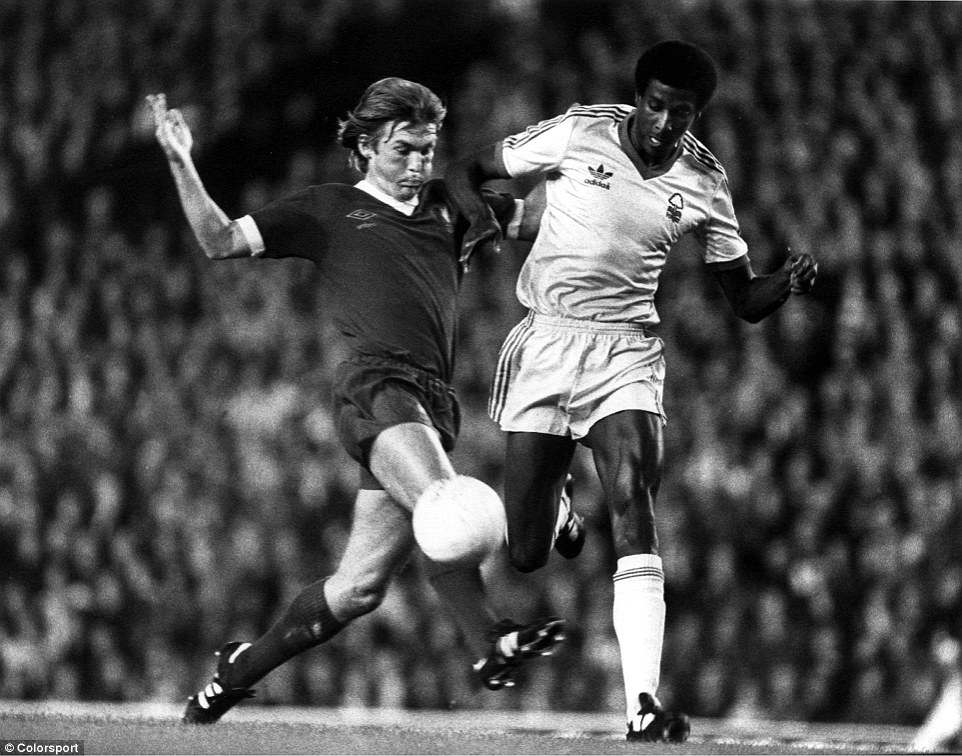
Today the meeting of English clubs in Europe is a common occurrence. Yet before the introduction of the Champions League format in which, ironically, non-Champions could now compete, such meetings were extremely rare. In fact this was the first fixture between two English clubs in the European Cup.
Liverpool, the reigning champions of Europe, took on Nottingham Forest who’d won their only league title the previous season. Manager Brian Clough was at the peak of his career, and there was no one his team feared. Clough, probably the most revered English manager of all time, had earned his reputation at nearby Derby County, where he had guided the Rams to the English League title.
His Forest players were still the underdogs, as Liverpool had already amassed two of their five European Cups. The first leg was played at Forest’s City Ground, and it proved to be the decisive match. Garry Birtles opened the scoring midway through the first half, and then played a part in Colin Barrett’s second.
In the return leg, Liverpool just couldn’t find a way through the Forest defence despite the partisan backing of the Anfield crowd. Forest got all the way to the final that year beating Malmo to become the smallest team ever to triumph in Europe.
The following season they retained the European Cup, becoming the only side to have been crowned champions of Europe more times than they won their domestic league.
1982: Aston Villa v Bayern Munich
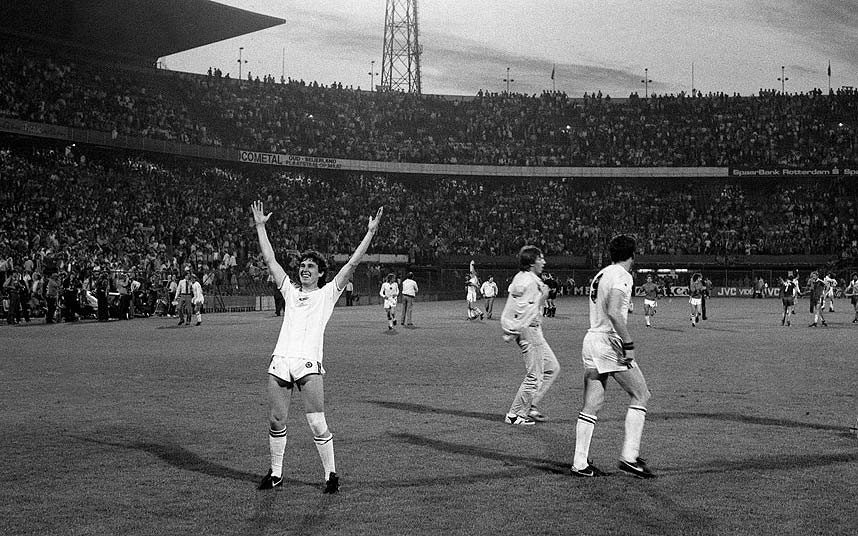
Such was the dominance of English clubs in Europe at the time, Aston Villa’s surprise capture of the Cup is not widely acclaimed. In the decade between 1975 and 1985, it was assumed that whoever won the English League would have a great chance of triumphing in Europe.
Ron Saunders who had masterminded Villa’s English Championship the season before, resigned mid-campaign. Furthermore, the English Champions had made one of the poorest defences of league title in English football history, finishing the 1981/82 season in eleventh position.
Saunders’ replacement, Tony Barton, is one of the forgotten men of English football, but he led the Midlanders to the European Cup Final in Rotterdam. There they faced European giants Bayern Munich.
The contest itself was not a classic. Jimmy Rimmer was injured ten minutes into the final. He had been the substitute goalie during Man United’s 1968 European Cup victory, and would again miss out. His replacement was Nigel Spink, a future Villa legend who was making only his second full appearance for the Birmingham team. He was probably the finest player on the pitch, making a string of fine saves.
The tie was settled in the 67th minute when Peter Withe converted Tony Morley’s cross, to score the only goal.
1999: Manchester United v Bayern Munich
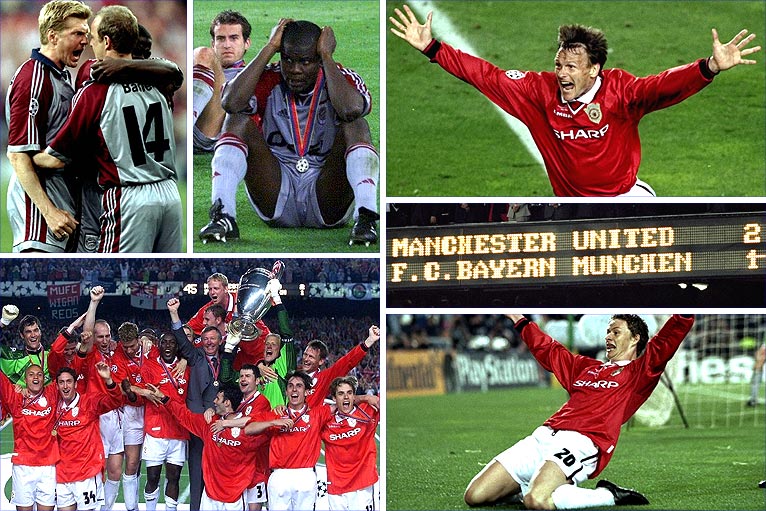
Man United can be considered fortunate to have even been in the final. The previous season they had finished runners-up in England to Arsenal, but the 1998/99 season was the first time that the competition had been extended to include non-Champions.
United’s greatest achievement was beating Juventus 2-3 away from home in the second-leg of the semi-final. This was the first time that manager Alex Ferguson’s had reached the final of Europe’s greatest competition.
In truth the Manchester team also played poorly in the final, but luck was on their side. Mario Basler opened the scoring seven minutes into the match with a well taken free kick. The United midfield was playing distinctly below par. Beckham was working hard, but ineffectively, and the Reds were sorely missing Roy Keane and Paul Scholes. Bayern continued to create the better chances with Basler and Stefan Effenburg coming close.
Just as it appeared that Mancunian luck was running out, an amazing turnabout occurred. In injury time, substitute Teddy Sheringham scored from a corner. Lightening then hit twice. United were again awarded a corner, and another substitute, Ole Gunnar Solskjaer, stabbed in an unlikely winner.
The luckless and bewildered Bayern players were left slumped on the pitch as the Reds celebrated.
2005: Liverpool v A.C. Milan
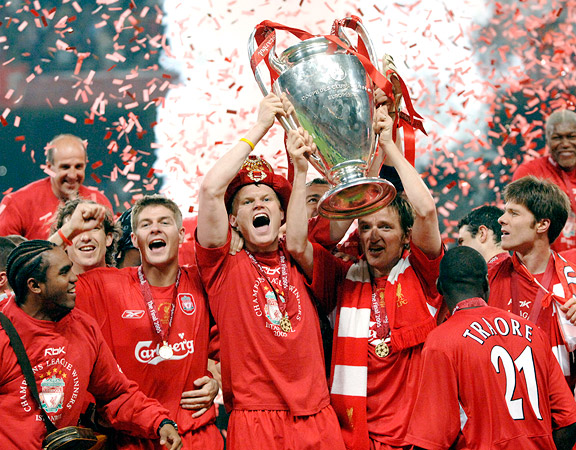
Between 1977 and 1984, Liverpool dominated continental football. They picked up four European titles, and as a result are the most successful British team in Europe. Regardless, the actual finals from Liverpool’s Golden Age were not particularly exciting affairs. The same could not be said of the 2005 final. Since the 1980’s the Merseysiders had experienced a marked decline, and their appearance in the final had not been widely predicted.
Manager Rafa Benitez, considered an expert in European football, had persisted with his controversial squad rotation system, which seemed to serve the club well during a congested fixture list at the end of the season.
Captain Steven Gerrard was one of just two Englishmen to play that evening, the other being Jamie Carragher. Veteran Italian defender Paulo Maldini scored inside the first minute, and the Argentine Hernan Crespo netted a brace during the closing stages of the first half to leave Liverpool trailing by three. However in the space of just six minutes, Gerrard, substitute Vladimir Scimer and Xabi Alonso each scored a goal.
Having thrown away a three goal lead AC Milan seemed incapable of regaining the initiative. Extra time passed uneventfully, and the clash was to be decided by penalties. Serginho, Pirlo and Shevchenko all missed for AC Milan, leaving Scimer to slot home the winning penalty.
The unfancied Liverpool team, considered by many to be a shadow of their former selves, had pulled off the greatest comeback in a European Cup Final.
2008: Manchester United v Chelsea
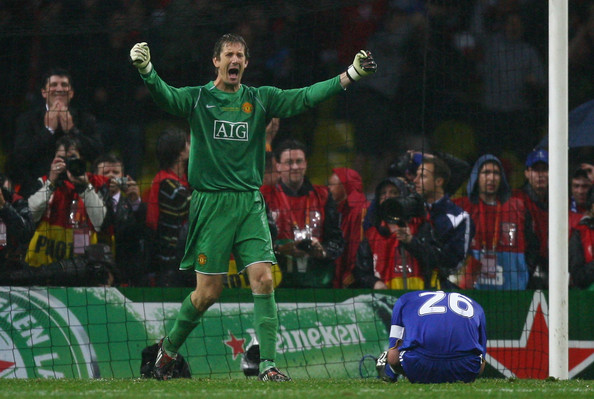
With the introduction of the Champions League format, fans were becoming accustomed to all English ties in Europe. Nevertheless, this was the first all English final. Chelsea was led by caretaker gaffer Avram Grant, whose squad had just missed out to Man United in the league.
The star of the United team was the brash but highly skilful Christiano Ronaldo who scored in the twentieth minute. Chelsea stalwart Frank Lampard then equalised at the end of the first half.
The next talking point did not arrive until extra-time, when Ivorian Didier Drogba was sent off , becoming only the second player to be red-carded in a European Cup Final. Yet ten-man Chelsea hung on for penalties.
In a dramatic ending Christiano Ronaldo missed his penalty. Captain John Terry had the chance to seal victory, but the Chelsea legend slipped as he approached the penalty spot and misdirected his kick wide.
The contest now went to sudden death with Anderson and Kalou both scoring for their respective clubs. Ryan Giggs held his nerve to score, meaning Nicolas Anelka’s miss condemned Chelsea to defeat.
2012: Chelsea v Bayern Munich
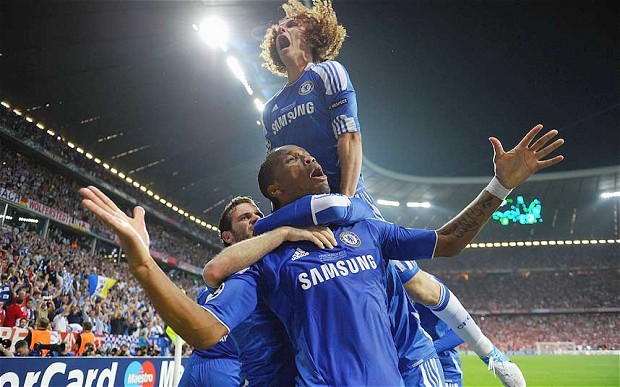
Chelsea have often been accused of buying their success. Their Russian billionaire owner Roman Abramovich has ploughed hundreds of millions of pounds into the club since taking over in 2003. Yet Chelsea had never quite managed to conquer Europe.
During the 2011/12 domestic season, the Londoners had a comparatively poor time in the English league, and Abramovich had sacked manager Andres Villas-Boas. His temporary replacement was the inexperienced Roberto Di Matteo. However the Italian caretaker boss steered his team towards an unlikely European Cup Final against Bayern Munich.
Most punters were expecting an all-Spanish affair, but Bayern defeated Real Madrid in the semis, and Chelsea produced an even greater upset by eliminating Barcelona.
The German side went into the contest as clear favourites, and were fortuitous in having home advantage (Bayern’s Allianz Arena had been selected as the venue of the Champions League Final earlier in that year).
Despite this, Bayern Munich had a woeful record against English finalists. Bayern held the upper hand throughout the match and with seven minutes left on the clock, Thomas Muller scored what looked like the winner. Didier Drogba was, however, in no mood to concede defeat in his last appearance for the Blues. He scored with a trade mark header with two minutes left on the clock.
In extra-time, Drogba then gave away a penalty. Arjen Robben’s poor strike was saved by Petr Cech, and neither team could produce a winner. Penalties were required to settle the tie. Mata missed Chelsea’s first, but his side were able to ride their luck.
Olic and Schweinsteiger both failed to convert their spot-kicks, leaving none-other-than Didier Drogba to send the keeper the wrong way and finally bring European glory to Roman Abramovich.
Written by Brian Heller
Like O-Posts on Facebook
You can also follow O-Posts on Twitter @OPosts
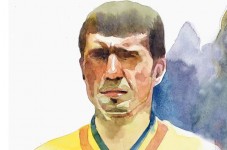
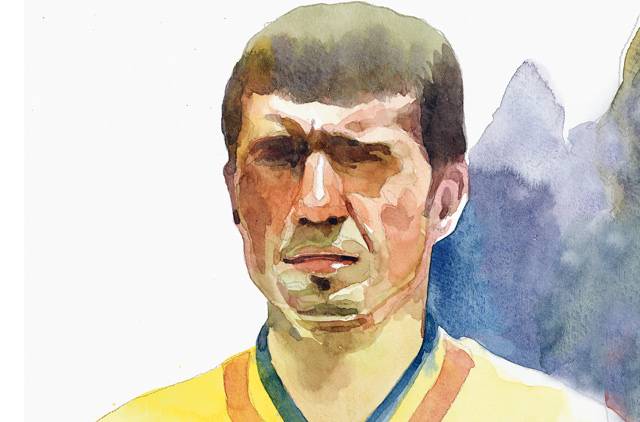
Short summary
The article presents the career of one of the greatest Romanian football players of all time in detail. Gheorghe Hagi was Romania’s best scorer and the national team’s leader during its most fruitful period. He played for top teams like Real Madrid and F.C. Barcelona.
Also, Hagi became Turkey’s hero after leading Galatasaray Istanbul to the all-time best performance in Turkish football: winning the UEFA Cup. The article includes a chapter on the player profile, depicts his activity after ending the football career and discloses some of his personal preferences.
Long summary
Every country has a huge talent, a symbolic football player within one generation. Zinedine Zidane was France’s football player of the ’90s, Raúl González was Spain’s football player of the ’90s, Del Piero is a symbol of Italian football and Romário is a symbol of Brasil in the’ 90s. Who was Romania’s symbolic football player in the ’90s?
Beginnings
Gheorghe Hagi was born on May 2, 1965, in Săcele, Constanța. His parents were Macedonian farmers. Little Gheorghe was declared the most technical football player of the Hope Cup and his name appeared in “Sportul” newspaper on September 7, 1976. Hagi played for the junior team under sixteen (four matches), for the junior team under seventeen (13 matches, 1 goal), for the junior team under eighteen (32 matches, 9 goals) and for the Olympic team (four matches). His first coach was Iosif Bükössi.
Club and national team career
Hagi started playing for F.C.Farul Constanţa (1982-1983), scored 7 goals and then moved to Sportul Studenţesc (1983-1987), where he scored 58 goals. Gheorghe Hagi started playing for the national team at the age of 18, in a friendly match against Norway, in 1983 (0-0).
Hagi was loaned to Steaua București in 1986, after the Romanian team won the European Champion Clubs’Cup in 1986. Steaua București (“Steaua” meaning “The star”) is the Army football team, was and still is the most prestigious Romanian football team. Hagi scored 76 goals in 97 matches and won three national championships and three national cups while playing for Steaua.
Hagi won the 1987 UEFA Super Cup (1-0, against Dynamo Kiev), scoring the decisive goal. Gheorghe Hagi was the leading scorer (four goals) in the 1988 European Champion Clubs’ Cup (he was equal to five other players). The owner of Panathinaikos wanted Hagi so bad in 1988 that he offered 8 million dollars to the dictator Nicolae Ceaușescu to allow the transfer to Panathinaikos, but the communist leader refused.
He considered the valuable football players as national values and did not allow them to leave the country until “they had done their duties” to Romania. Some of the football players left Romania illegally (Miodrag Belodedici - Red Star Belgrade, Marcel Răducanu - Borussia Dortmund), others continued to play in Romania in spite of the considerable offers from major clubs (Ion Voinescu - Arsenal Londra, Vasco da Gama, Florea Dumitrache - Juventus Torino, Nicolae Dobrin - Real Madrid, Cornel Dinu - Bayern München, Ilie Balaci - A.C. Milan, Rodion Cămătaru - F.C.Kaiserslautern, Benfica Lisabona).
While other Romanian football players were allowed to leave abroad at the end of their careers (Rodion Cămătaru - Charleroi, Boloni -Racing Jet de Bruxelles, Tudorel Stoica - Lens, Victor Pițurcă - Lens). Steaua reached the 1989 European Champion Clubs’ Cup final (lost 0-4 to Milan).
After Romanians gained their liberty in the 1989 Revolution, Hagi was transferred to Real Madrid for 4.3 million dollars, where he played for two seasons (1990-1992) scoring 15 goals.
From there, he joined Brescia (1992-1994), helping the team to return to the first division (Serie A) scoring another 15 goals in the process.
Hagi led Romania in the 1984 UEFA European Championship and the 1990 FIFA World Cup and then he achieved the greatest performance in the whole Romanian football history, namely acceding to the 1994 World Cup quarter-finals in United States. He scored three times there, including a brilliant lobbed goal from 40 meters against Colombia.
Hagi’s goal against Colombia (3-1) was also voted the fifth in a poll hosted on FIFAworldcup.com, gathering 9,297 votes. There were 341,460 votes online from over 150 countries worldwide for the greatest goal ever scored in FIFA World Cup history. Romania lost on penalties to Sweden (2-2, 4-5, after penalty kicks) in its 1994 World Cup final match. Hagi was the fourth football player in the world in 1994 (50 points), according to FIFA. He was selected in the 1994 FIFA World Cup All-Star Team.
Hagi’s performances attracted F.C.Barcelona’s interest and the Spanish club transferred him for 3 million dollars. Hagi scored 7 goals for Barcelona in two years (1994-1996), winning a second Spanish Super Cup for his team.
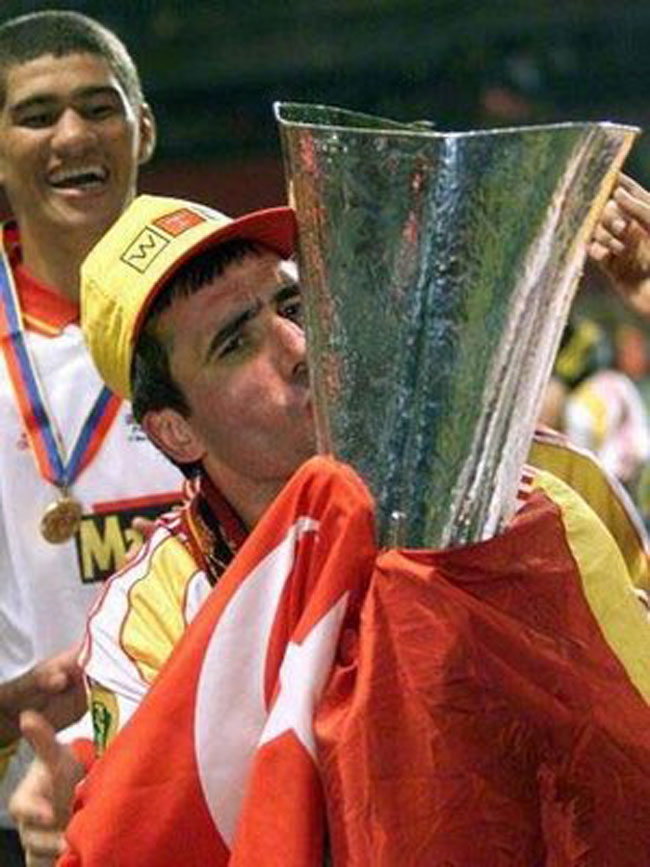
Hagi with the 2000 UEFA Cup trophy.
Hagi joined Galatasaray (1996-2001), where he won four championship titles (1996, 1997, 1998, and 1999) and two national cups (1999, 2000). He scored 50 goals in 132 matches for his team. Gheorghe Hagi became Galatasaray’s leader and won the UEFA Cup (1999-2000) in a penalty shootout against Arsenal. Galatasaray Istanbul became the first Turkish team to win a major continental trophy and Hagi was the hero. Three months later, Galatasaray won the European Super Cup (2000), defeating Real Madrid.
Adrian Păunescu, a poet, convinced Hagi to return to the national team in an emotional and carefully prepared TV show in 1999, one year after his retirement. Hagi was cheered by his fans at three o’clock in the morning. It was a night to be remembered… Hagi retired in 2001 after 125 caps.
Player profile
Style
Gheorghe Hagi was a great leader on the pitch, blessed with sublime vision, a creative, ingenious and precise passing ability, a disconcerting dribbling and an outstanding ball control. He was a greatly feared shooter from any distance and position. He also had a fine free kick technique. Hagi wore number ten.
Fair play
Although Hagi was mostly fair and disciplined player throughout his career, he was eliminated several times in the final years of his career, including during some important games like the final of the 2000 UEFA Cup against Arsenal, in extra time, when playing for Galatasaray (won 0-0, 4-1) (94 minute) and the 2000 European Championship quarter-finals, when playing for Romania (lost 0-2 to Italy).
He also attacked a Turkish referee in 2001, leading to a lengthy suspension (six matches) (Galatasaray- Gençlerbirliği SK 2-1).
Various records
Hagi was the top scorer in 1984-1985 season and then again in 1985-1986 season. He scored 141 goals in 222 matches in domestic games (0,63 goals per game). His domestic record is only second to Dudu Georgescu (Dinamo Bucureşti), who held the record (47) for goals scored in one season for a long period (1977-2012, which was eventually surpassed by Lionel Messi- 50 goals) and who also won the European Golden Shoe in 1975- 33 goals, who bagged 252 goals in 370 matches.
Hagi’s percentage (0,63 goals per game) is very close to Dudu Georgescu’s percentage (0,68 goals per game), a very rare performance for a midfielder. Hagi was declared the best Romanian football player of the year seven times (1985, 1987, 1993, 1994, 1997, 1999, and 2000). He has also scored 32 goals in 95 games in European Cup tournaments.
As an offensive midfielder, Hagi compensated for the weakness of the Romania national team’s attack in many cases. A midfielder is rarely the top scorer yet Hagi surpassed the very durable record of Iuliu Bodola, a football player of the ’40s (1939, 30 goals, 48 matches) in 1997 and still holds the first position (35 goals), which Adrian Mutu equaled in 2013.
Gheorghe Hagi played in three World Cups (1990- Italy, 1994- United States, 1998- France) (equalling the old national record of Nicolae Kovacs, present in the World Cup Final Tournaments in 1930, 1934, 1938 and playing 12 matches) and in three European Championships (1984- France, 1996- England, 2000- Belgium and Netherlands).
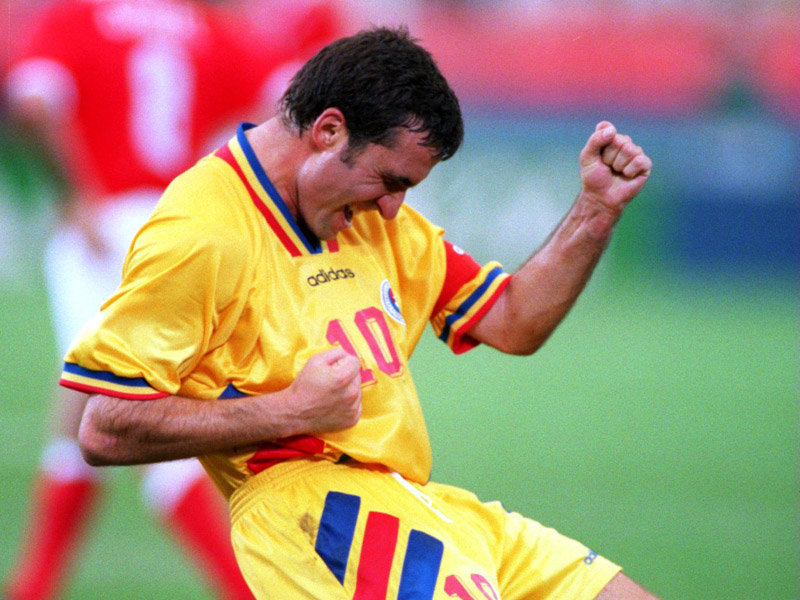
Gheorghe Hagi also surpassed Boloni‘s record for caps (108 matches for the national team) which had lasted ten years (1988-1998). Hagi holds the second place (125 caps) after Dorinel Munteanu (134 caps). Hagi led Romania 65 times (continuously 1990-2001), holding the present record (the next one is Cristian Chivu, Internazionale Milano, 50 times).
Post-football career
Hagi coached the Romania national team, Bursaspor, Galatasaray (twice), FC Politehnica Timişoara and Steaua București. He won a National Cup as Galatasaray’s coach in 2005. He founded “Academia de Fotbal Gheorghe Hagi” (Gheorghe Hagi Football Academy) for training football talents and also founded Viitorul Constanţa, which promoted to the First Division in 2012.
Beside his coaching activities, Hagi is a businessman, he owns the four stars Iaki Hotel in Mamaia. In addition, Hagi is National Goodwill Ambassador for UNICEF Romania, supporting children in difficulty.
Private life
Hagi is married for the second time. His first wife was Leni Celnicu (1990-1995) and he is now married to Marilena Vlahbei, Gheorghe Popescu’s sister. He has two children from the present marriage, Kira (15 years old), who has humanist inclinations, and Ianis (13 years old), who plays football. Hagi has two older sisters, Sultana and Elena.
Gheorghe Hagi is a close friend of another great Romanian football player, Gheorghe Popescu, who was FC Barcelona captain. Hagi enjoys listening to Elvis Presley, the Beatles and Mariah Carey. He likes Johan Cruijff as a football player and coach, J.F. Kennedy as a politician and Napoleon as a historical figure.
His favorite actors are Al Pacino and Michelle Pheiffer. Hagi likes eating macaroni and drinking red wine and prefers Hugo Boss clothes and BMW cars.
Conclusion
“Maradona of the Carpathians”, as Gheorghe Hagi is sometimes called, is a hero in Romania and Turkey alike for helping both countries decisively establish their greatest national or club performances. The Romanian Football Federation declared in 2008 that Hagi is the most valuable Romanian football player in the last 50 years.
Miodrag Belodedici (the Romanian football player with the best club success, namely that he won the European Champion Clubs’ Cup twice, in 1986 with Steaua București and in 1991 with Red Star Belgrade), Gheorghe Popescu (winner of the 2000 UEFA Cup with Galatasaray, was also Barcelona captain in the 1996-1997 season) and Cristian Chivu (winner of the 2010 Champions League with Inter Milan) are the other Romanian football players with international performances.
“The King”, as some people called Gheorghe Hagi, is one of the most popular Romanian sport players abroad, along with the great gymnast Nadia Comăneci and the tennis player Ilie Năstase of the ’70s, and along with football players Adrian Mutu and Cristian Chivu of the present generation.
Written by Vladimir-Adrian Maftei
Like O-Posts on Facebook
You can also follow O-Posts on Twitter @OPosts
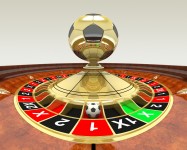
Football betting has long been popular amongst those that like to gamble, as illustrated by the ubiquitous presence of betting shops on high streets across the United Kingdom. Yet unlike many formerly popular industries, the world of football betting has thrived in the era of the internet.
Indeed, all of the major bookmakers like bwin.be have setup online versions of their physical shops, leading to not only a mass exodus from the high street to the virtual world of online gambling, but it has tempted a greater proportion of the population to gamble on sports than ever before.
Now, in terms of popularity, football betting is matched only by the wealth of similarly popular online casinos.
Reasons for the continued and increasing popularity of football betting:
1. Convenience – this is arguably the main reason for the aforementioned surge. The added convenience has been generated by giving those interested in sports betting the ability to find tips and odds information, in addition to being able to place bets securely online.
The World Wide Web has therefore made football betting into something that is very accessible in terms of the ability that the average punter now has to make an informed betting choice.
2. Audience – There has been a marked increase In the level enthusiasm for sport in general amongst the public, but it is football – and the Premier League in particular –that has seen a surge in popularity and therefore in the number of people betting on its results.
3. Advertising – The likes of Bwin are experts in marketing their brand and bringing themselves to the attention of a mass audience. Indeed, sponsorship deals with European footballing behemoths, Real Madrid and AC Milan, have obviously brought the betting site to the attention of a massive audience, thus helping to increase the popularity of sports betting on a global scale.
Please like O-Posts on Facebook
You can follow O-Posts on Twitter @OPosts
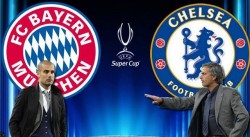
Sometimes I wonder who writes these scripts. You know, Josep ‘Pep’ Guardiola returns from his sabbatical and Mourinho is back at his ‘beloved’ Chelsea. What happens next? They face-off in Europe for a very important ‘winner takes-all’ game. Whoever is victorious will not only smile home with the trophy, but also the upper hand in their never ending rivalry.
Mourinho stoked the fire recently by throwing tantrums at Pep, questioning his coaching abilities. The revered Managerial great hasn’t replied the Portuguese coaching legend, but Uli Hoeness, President of Bayern Munich has defended his current manager in the light of comments made by Jose. All these and more will make Friday’s game hugely entertaining.
For all those who are ardent followers and keen admirers of the Super Cup, you must be used to the fact that it has always been played in the principality (Monaco). The St Louis II Stadium has hosted the game since 1998. However, that has changed this year. Friday’s showpiece match will now be played at the Eden Arena, Prague-Czech Republic.
As a result of Super Cup commitment, Bayern had to play Freiburg in the Bundesliga and that ended in a disappointing draw for the Bavarians. Pep rested some of the big names for the big one in Prague.
Jose Mourinho also had to take his men to Old Trafford with the intention of becoming the first club to achieve the distinction of defeating Manchester United on their own turf two times in a Calendar year. It finished nil-nil in a rather stoic affair. Attention has shifted to the Super Cup clash.
For Mourinho, he is about to win a trophy he will not have deserved, considering the fact that is another of his adversary, Rafa Benitez, who led the blues to EUROPA LEAGUE glory in Amsterdam. It is a classic tale of ‘what goes around, comes around’.
When the now Napoli boss (BENITEZ) took over as Inter boss in the Summer of 2010 following Mourinho’s exit, the latter criticised his successor, complaining that if Benitez hoists any of the trophies he qualified the Nerazzurri for, the glory would be his, rather than that of the new boss.
The Spaniard went on to lose the Super Cup, but made amends in the World Club Cup. Now the table has turned and it is Jose who might be at the wrong end of the words he blatantly uttered three years ago. Knowing how proud and arrogant he is, he might just hand the trophy over to Bayern if he can.
Bayern Munich and Chelsea are the last two clubs to win the UEFA Champions League and coincidentally, it was Chelsea who inflicted one of the most crushing defeats on FC Hollywood last year in a pulsating final at the Allianz Arena.
Incidentally, it was Drogba’s last kick for the 3-time Premier League Champions which sealed the club’s maiden UCL triumph. The Ivorian has since moved on to China and most recently, Turkey, wearing the famous colours of Fatih Terim’s Galatasaray. No matter what they say in public, the Bavarians will want nothing short of victory in Friday’s ‘very important game’.
More significant because Chelsea are now better equipped than two seasons ago and ‘The Special One’ has returned to the helm. Bayern have also strengthened. Bringing in the likes of Mario Gotze, Thiago Alcantara (out for 7 weeks) and shipping off both Luis Gustavo and Mario Gomez to Wolfsburg and Fiorentina, respectively. Mourinho has been very busy in the Transfer Market too, recruiting the likes of Mario Van Ginkel, Andre Schurrle, Wallace and Willian.
Irrespective of all these, it is the continued exemption of Mata from the Starting eleven that is a source of worry for fans and admirers of the 2-time Chelsea player of the year. The club’s most consistent performer of the last two seasons now finds himself on the periphery of the new manager’s plans. We have been hearing that he is carrying an injury.
That doesn’t take the biscuit in my opinion. Mou clearly prefers the industry of Kev De Bruyne and I can understand why. It’s his choice and he clearly has his own strategy. Suitors are coming thick and fast for the brilliant playmaker (Mata).
Chelsea will need to be at the top of their game to avoid a repeat of ‘THE FALCAO SHOW’ which happened last year in Monaco. It was Chelsea-Atletico Madrid then with the Blues=European Champions and Los Rojiblancos, Europa League winners. That was where the difference ended.
Colombian Tiger, Radamel Falcao continued from where he left off in the Europa League, scoring a perfect hat-trick v the pensioners in a match that ended 4-1 in favour of El Cholo’s Colchoneros. Little did he know that one year on, the Principality would be his home for the foreseeable future.
We don’t expect a high scoring encounter considering the capabilities of both teams’ rearguard - but in football, we have learnt never to say never. It will be the Blues’ second straight appearance in what a few of us have tagged ‘THE CHAMPIONS GONG’. Bayern haven’t been in this situation in twelve years, so we can pardon them if they treat it with utmost necessity.
The heavy burden of being ‘European Champions’ and ‘The Best team in the World’ might weigh down on their shoulders anytime soon. They, nevertheless, would want a longer reign than Barcelona in this regard.
To continue to occupy the throne, they must first defeat Chelsea and then focus on December’s Club World Cup. The win is more important because they were undone by Dortmund in the Domestic Super Cup a few weeks ago. That memory still lingers on, until something of note temporarily erases it.
The Bavarians will be extremely delighted to play a Drogba-less Chelsea after all the harm the Ivorian has caused in meetings of the past seven years. Oliver Khan once stated that Double D (Drogba) is the best striker he faced in his immensely exceptional career. That is some compliment considering the fact that Ronaldo Da Lima sent him to the cleaners eleven years ago in the World Cup title match.
But there is a man who can have as big an influence as Didier in Mourinho’s squad. He is Romelu Lukaku. The Belgian starlet scored 17 League goals for West Brom last season, including a 45 minute hat-trick against Manchester United. Any one who has such an impressive RESUME can do damage at any level, given the chance.
If he gets the nod to spearhead the attack, the likes of Dante and Boateng must keep a close eye on him. The trio of Oscar-Hazard-Ramires have featured in all three Mourinho managed games so far. Goes to show how highly he rates them. Lampard’s starting berth might be threatened now, with the arrival of WILLIAN. Th ex-Anzhi and Shakhtar playmaker signed for the Europa League winners rather than Tottenham Hotspur
For Chelsea, the likes of Franck Ribery (Nominee for UEFA PLAYER OF THE YEAR alongside Leo Messi and Cristiano Ronaldo), Arjen Robben (who Mourinho and Chelsea know so well), Mario Mandzukic, Bastian Schweinsteiger (doubtful for the clash)-unarguably the best midfielder in Europe this year, and Thomas Mueller are the biggest threats to their ambition of becoming holders of the 2013 UEFA SUPER CUP.
The ROBBERY(ROBBEN-RIBERY) gang were unplayable last season and have continued in similar fashion this term. Last Saturday, they scored two beauties to win the Bavarian Derby vs a stubborn Nurnberg. Robben’s the peak of the double. Thomas Mueller has grown into one of the best players in the world since his excellent performance at the 2010 World Cup.
When he is called upon, he rarely fails to deliver. Mandzukic was the reason why Gomez headed to Italy. The Croat has grown in leaps and bounds since his arrival from the Volkswagen Arena last summer. Has been a regular in all of Pep’s starting line-ups since the beginning of the season. Schweini is the dominant force in the Bayern midfield.
Never one to shy away from the big ones. An excellent ball distributor, a great tackler and one with an eye for goal is the complete package. The Bundesliga Champions are such a lucky bunch. It is a pity that Thiago will be unavailable for the Treble winners. However, there are so many options in midfield and attack. He won’t be missed.
For both teams, pride and history are at stake…and then the small matter of managerial supremacy between two of the greatest managers of all time. Although, Pep has the big H2H advantage, if he loses this to Mourinho, it would perhaps be the most excruciating loss of his career yet.
The Chelsea coach will want nothing more than victory over his biggest rival of the last five years. How sweet it will taste.
PROBABLE LINEUPS
BAYERN MUNICH: Neuer, Lahm, Dante, Boateng, Alaba, Schweini, Kroos, Robben, Ribery, Muller, Mandzukic
CHELSEA: Cech, Ivanovic, Terry, Cahill, Cole, Ramires, Lampard, Oscar, Mata, Hazard, LUKAKU
Bayern can lay claims to the fact that they have the best eleven in European club football at the moment. Most of their players are top five in the world in their respective positions. That says a lot. The game might be decided by small details and Cech/Neuer might well be decisive too. There’s an old saying that attack wins games, defence wins titles.
Without a strong rearguard, the possibility to accumulating titles in world football is very slim. Jose Mourinho started the Manchester United game without a recognised striker. He is unlikely to repeat the same on Friday. The ‘False NINE’ tactic is not one of his strong points and would have backfired if RVP and co were not profligate in front of goal.
The bulk of the team that featured at the Theatre of Dreams will again be called upon - De Bruyne and Schurrle may have to start from the bench.
Written by Ohireime Eboreime
Follow Ohis on Twitter @ohiskaka1990
Please like O-Posts on Facebook
You can follow O-Posts on Twitter @OPosts
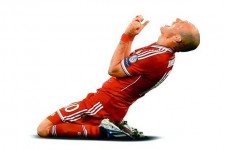
As the international football season wraps up, it is a very tough time for a lot of fans. If a season was terrible, the end can seem a welcome relief. And if your team was outstanding, it can be great to see a wonderful run end well. In either case, you’re left counting the days until the new season begins, and the months in between can leave one with a “now what” sensation.
Rather than sitting and doing nothing, there are some proactive ways to handle the end of the association football season.
Get Out Of The House
A regular trip to the pub where you watch games doesn’t count. No, now is the time to stretch legs or fire up the 2007 mustang. Go out and breath the free air, and remember that there are things that are great in the world that have nothing whatsoever to do with “the beautiful game”.
The less time you spend in places associated with the game, the more likely you can find constructive ways of biding your time until the next season begins.
Develop Post Season Hobbies
If you make sure that you are busy, you won’t have time to sit around moping. Plan ahead and make sure that your weekends are filled. Visit friends. Take a vacation. Learn how to surf. Just be sure that you have your off season time loaded with activities. You can develop yearly traditions that take your mind off of the stress associated with being a football fan and enjoy time away from the game.
Find Other Sports Leagues To Follow
Probably one of the best ways to distract yourself from the end of association football is to look around for other sports that are going on during the break. If you’re the type of person that can follow multiple sports and leagues, it may be a good idea.
There are international events such as the World Cup that also occur during the off-season. These may offer you the opportunity to continue to enjoy the sport, or introduce friends and family to the sport.
Use It As A Time To De-Stress
Instead of looking to other sports, it may be an even better idea to go in the complete opposite direction: Tune out of all sports news for a time. It’s a documented fact that dedicated soccer fans can develop a heart condition related to their involvement in the sport. The ups and downs can take a very negative toll on the mind and body. This may explain why fans feel so drained and empty when the season is over.
Instead of seeing the end of the season in a negative light, think of it as a blessing in disguise. This can be a valuable time to recuperate, take a deep breath, and re-energize. Using this time wisely can allow you to be charged up and ready to go when the games start back up again.
Written by Michael Deaven
Follow Michael on Twitter @MichaelCDeaven
You can also find him on Google+
Please like O-Posts on Facebook
You can follow O-Posts on Twitter @OPosts
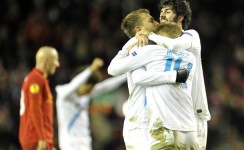
A week may have already passed since last week’s Europa League drama at Anfield, but there has been no let up in the controversy that has followed the game. Whether it be Liverpool’s dramatic comeback or the antics of Luis Suarez, it was a game that so far, has been impossible to forget. While Zenit can look forward to a round of 16 tie against Swiss side Basel, Liverpool are left with bitter regrets after coming so close to pulling off a remarkable comeback against the Russian champions.
But it hasn’t just been the football that has proven to be the talking point. After the final whistle, many Zenit fans have called for Liverpool star Suarez to be banned from football until he can learn to play the game properly, after Suarez was spotted on camera stamping on the back of defender Tomas Hubocan, and earlier, deliberately hacking down Nicolas Lombaerts. Ultimately Zenit had the last laugh with progressing, but you can’t ignore the fact Liverpool came so close to cheating their way into the last 16 ahead of the Russians.
When the draw for the last 32 was made in December last year, it was straight away singled out as one of the ties to watch out for, two games that would capture the attention of not just Europe, but the whole of the footballing world. And not just traditional football fans decided to take a look, in my case even my whole family took to the TV to see how a club steeped in such tradition as Liverpool would cope against a Zenit side which has gained European pedigree only in the last few years.
And both games didn’t disappoint in the slightest. Not just the second leg at Anfield had all the thrills and spills of a typical old fashioned cup tie, the game in Saint Petersburg was no less enthralling. End to end football was the order of the day, and the controversial Suarez himself could of helped himself to a Russian hat trick. But instead it was Zenit’s Hulk who stole the show, unleashing a blockbuster of a shot to open the scoring on 69 minutes, and that was followed quickly by veteran Sergey Semak capitalising on some stilted defending to slot home.
That goal eventually ended up to probably be the killer goal in the tie, but it could have been so different. Liverpool created no less chances than their hosts, albeit mostly down to Zenit’s slack defending, but how the English outfit didn’t get at least one away goal still puzzles many two weeks after the game.
While the first game lacked in controversy, that was all about to be made up for in the second leg in Liverpool. Before the game Liverpool’s living legend and captain Steven Gerrard had publicly made a call for the Merseyside faithful to be even louder than usual given the daunting task facing the hosts, and they certainly paid attention to him. Anfield may always be a cauldron of noise even on the smallest of occasions, this was just something else. The incessant deafening shouts of the Kop were heard from the first minute all the way to the last, and almost just on voices alone did Liverpool turn over their Russian counterparts.
And yet for Zenit the evening started so well. Hulk capitalised on a loose back pass to finish calmly past goalkeeper Pepe Reina, and with that, the tie looked done and dusted. It proved to be anything but. Luis Suarez smashed home a free kick just 10 minutes later, and moments before half time Joe Allen squeezed the ball in to bring the hosts within two of progressing.
Just 15 minutes into the second half it was 3-1, a stunning Suarez free kick bring Liverpool within an inch of adding Zenit to their long list of comeback victims. But it wasn’t to be with Zenit holding out for the remaining half an hour to just about go through to the last 16, and a collective sigh of relief was felt all the way from Saint Petersburg. The real talking though had only just started.
Liverpool’s number 7 and Kop hero Luiz Suarez has always been in the thick of it. From that unforgettable deliberate handball against Ghana in the World Cup quarter final of 2010 to racially abusing Manchester United’s Patrice Evra, he has never shied away from being in the spotlight.
And the game at Anfield encapsulated his career in just 90 minutes. In scoring two fantastic free kicks, in particular his second goal in the second half, he showed the whole world, just how much talent he has. On his day he is one of the most dangerous forwards on the globe and for 180 minutes he tormented the Zenit defence throughout, with the Russians in the end only just surviving.
To go with his remarkable and special talent though, he possesses the unwanted quality, of letting himself down horribly.
While on Russian soil he may not have done anything that appeared untoward, the game in England proved to be the complete opposite. His pure hunger and desire to win was obvious and that is only to be admired, but he was up to his old tricks again. Tripping up any Zenit player when he could, he then went a step further. In the lead up to Liverpool’s second goal, he hacked down the Belgian Lombaerts, an incident which forced Lombaerts off the pitch. And then came the most talked about moment, right at the end of the game.
With frustration rife amongst the Liverpool players, Suarez took it upon himself to rake his right foot on Tomas Hubocan’s back, an incident which was caught right on camera for the whole world to see. Somehow the officials missed the incident, and even more surprisingly, club officials at Zenit decided to not even follow up the incident with UEFA.
That hasn’t stopped Zenit fans venting their anger though, and it’s up for debate, whether such a player holds the right to be on the football field. No one doubts the talent that the Uruguayan star possesses, it’s on show just about every week for everyone to see. But such ‘tactics’ that he uses to try and win games illegally, shouldn’t be allowed to continue any more. UEFA themselves cannot follow up this most recent incident however as the referee for the night Björn Kuipers didn’t file the incident in his match report, but surely it can’t be too long before someone somewhere clamps down on such dirty tactics.
In any case, the only ones smiling come the final whistle were Zenit. The Russians survived a severe storm at Anfield and their reward is what should be a slightly less traumatic tie against Basel, and Zenit’s tag as one of the favourites for the Europa League trophy has surely only been enhanced after somehow surviving in one the loudest stadiums in Europe.
Even more pleasing however, is to see the back of Suarez for at least another European season.
Written by Shaun Nicolaides
Follow Shaun on Twitter @zenitfan93
Please like O-Posts on Facebook
You can follow O-Posts on Twitter @OPosts
Not since 2008 have Zenit Saint Petersburg had a chance to prove their worth to the English, but five years on, and following that historic victory over Manchester United back in that momentous year of 2008, the Russian champions have a chance to defeat Manchester’s own great rivals.
Liverpool, a club which has been in decline for the past few years now, may not be the force it once was, but you will be hard pushed to find any team who relishes playing against the patriotic support of the Liverpudlians.
But for Zenit it won’t just be chance to prove themselves to the English, but to Europe overall. After having to go through scandal after scandal in their Champions League campaign, a mere 7 points were amassed, just enough for a Europa League slot. But a new year brings new hope, and after a calm winters break, the team is ready to come roaring back into action.
The Europa League may not quite have the glitz and glamour that the Champions League has, it’s still a tournament which attracts almost as much as attention, and with teams such as current European Champions Chelsea competing, the status of the so called ugly sister of the Champions League is only rising.
While many ties in the last 32 catch the eye, none more so does than this one, which pits two former UEFA Cup winners together and will indicate, just how good this current Zenit team really is.
Right at the beginning of September, optimism was rife amongst the Zenit faithful. After years of transfer disappointment, finally big time players found themselves making the trip to Russia’s cultural capital Saint Petersburg. But the only thing that Hulk and Axel Witsel achieved in doing was putting the Zenit old boys backs up.
Both Igor Denisov and Alexander Kerzhakov led an in club revolt, a situation that was resolved too late to rescue the Champions League campaign that fell apart to pieces right before our very eyes. Just 3 points from the first 4 games killed off any hopes of a repeat of last season’s trip to the playoffs, but then we just began to see the true Zenit character.
2-0 down in the home game to Malaga, grit and determination managed to save the game in claiming a 2-2 draw, and on the last matchday away to already qualified AC Milan, a lone Danny goal along with resilient defending meant that Zenit claimed their first away win in Europe for 2 years and in doing so, squeezing into the Europa League playoffs at the expense of Belgians Anderlecht.
While maybe some fans may still have turned their nose up at Europa League football, that all changed when the draw for the last 32 was made.
You can understand why noses may have been turned up at first though. After competing shoulder to shoulder with clubs with the status such as Milan, the prospect of playing against teams which you may have never even of heard of, doesn’t seem too attractive. But as soon as Liverpool were drawn out of the hat, all of a sudden the Europa League didn’t seem so bad after all.
A tie that wouldn’t look out of place in the Champions League, it gives Zenit the opportunity to prove that the typical effectiveness of British teams can be defeated by real style. And if the winner is to be determined by style, then there will be only one winner.
While the Russians can boast up to 4 or 5 players of world class level, Liverpool can claim just the two, midfield legend Steven Gerrard and the ever controversial Luis Suarez.
English football has seen quite a few drastic changes in the last few years, not least with the overnight growth of Manchester City.
Traditional underperformers Tottenham Hotspur are also now pushing for the top spots, but with clubs rising, some have to fall. And that fall guy is the 5 times European champions Liverpool, a club which was a Champions League fixture just a few years back. But times have changed, and even just qualifying for the Europa League is regarded a success for England’s fallen giant.
That’s not to say they always treat the competition with respect that is. Almost always, a second string is sent out on the field, and the English media happily slam the competition at any given moment. But everyone in England is well aware that the visit of Zenit is not to be treated lightly. While it is still unclear what kind of team Liverpool will send to Russia and for the game in England, fans at least seem to be aware of the task at hand.
I personally know many Liverpool fans, and after them being able to watch Zenit’s games in the Champions League for the past few years, they’re giving it a run for their money. The transfer of Hulk last summer particularly captured headlines in England and got everyone talking, but if many thought that only happened because of the money, the perfect opportunity to prove that wrong has arrived.
Hulk may be still finding his feet in Zenit, but the fact that he can change the game immediately with just letting rip with his ferociously powerful shot hasn’t changed. And a Liverpool defence, that doesn’t always look the most solid, will have to be fully switched on for the full 180 minutes of the tie.
But while English and Liverpool fans may still know more about Hulk himself than Zenit, it’s all about to change. Zenit look fresh and ready to go after two successful training camps in Dubai and Turkey, and while just two reasonably low key signings were made, with the purchases of young Serbian prospect Milan Rodic and Portuguese international Neto, incidentally both defenders, fans have reason to be confident.
The scandal with Denisov and Kerzhakov appears to be finally put to bed, and with Danny now fully fit, Zenit should be firing on all cylinders. Liverpool themselves haven’t been going through their worst form recently, but their over reliance on Gerrard and Suarez surely has to come back and bite them at some point.
The priority however, will be without a doubt, not conceding at home. The dodgy record on the road in Europe in the past couple of seasons signals that only a clean sheet and at least a 2-0 win at Petrovsky will fit the bill.
I’m sure even the most ardent of Liverpool supporters won’t be able to deny just how intimidating the Zenit fans are when watching the game in Saint Petersburg, and it’s the perfect opportunity to see the ever rising strength of Zenit and just how quickly Liverpool are fading away from the European scene. Expect drama.
Written by Shaun Nicolaides
Follow Shaun on Twitter @zenitfan93
Please like O-Posts on Facebook
You can follow O-Posts on Twitter @OPosts
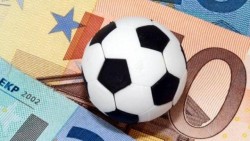
On Monday, Europol, the law enforcement agency of the European Union, announced the results of an 18 month inquiry of match-fixing in football to a reaction of immense shock throughout the game.
They revealed that a total of 680 matches across the world were fixed, including a Champions League tie that had been played in England which went someway to hinting at the seriousness of their findings. Not only would they concern a club close to home, but it gave a lucid indication that match-fixing was now festering in the very highest levels of the sport.
It was an investigation that originally only involved Germany, Finland and Hungary, but expanded to over 30 countries spanning right across the world. The European Police revealed that Asia had staged 300 corrupt matches while Europe played host to 380, including “several top football matches in European leagues as well as World Cup and European Championship qualifiers”.
Officials went to the extent of revealing the figures of corruption in Germany-based matches alone; £13.9 million in total was wagered to a profit of £6.9 million and very worryingly, as they voiced from behind a stall in The Hague, this was “just the tip of the iceberg”.
However, there was a slight sense of apprehension to the report that UEFA are now awaiting in detail according to Rob Wainwright, Europol’s director. The FA, reacting to the bombshell that one of the matches in question was a Champions League game hosted in England “three or four years ago”, said they were “not aware of an credible reports into suspicious Champions League fixtures played in England, nor has any information been shared”.
The match in question was quickly confirmed as Liverpool’s one-nil win over Hungarian side Debrecen back in 2009. Charges involved Debrecen goalkeeper Vukasin Poleksic for not informing officials that he was approached by fixers prior to a game with Fiorentina in that campaign, for which he was banned for two years. However, the charges only specified the Italian club and not Liverpool, who maintain they have never been told by any organisation that the match at Anfield was under investigation.
A case that concerned a goalkeeper who had previously been severely dealt with by European football’s governing body hardly fitted into the sensationalist headlines the investigation should have demanded, but it was clear as the revelation continued that the issue went far, far deeper into the heart of the game. They created a macabre of criminal syndicates, based mainly in Asia, using facilitators in Europe to bribe and corrupt all those involved in the game for financial gain.
Over 425 suspects were identified by an investigation that involved 50 arrests and 80 further search warrants. Wainwright portrayed a dark, eerie criminal network spreading itself into Europe from its epicentre out in the far-east.
It is believed that the betting syndicates are operating not only on results, but on certain events in matches similar to the no ball scandal that scourged the Pakistani cricket team back in 2010. That should be familiar to the everyday football fan who is exposed to in play betting and the plethora of markets now available to betting companies who have developed into a mass businesses on the back of such practice.
With so many areas on which to place money in the sport, there is always a suspicion that a footballer can take advantage on an individual level, it was Southampton’s Matt Le Tissier who claimed he made a spread-bet, of which he failed, on himself to win the first throw-in in a game with Wimbledon back in 1995.
Europol’s findings have taken that suspicion and multiplied it to a grave worry that manipulation is taking place on the grandest of scales via a murky underground network of criminals threatening to send a game that has always prided itself on fair play and honest competition into a state of decay.
With the African Nations Cup taking place in South Africa, Paul Put, the Belgian coach of Burkina Faso, said he was not surprised by Europol’s findings, claiming the problem is pandemic.
He has had a previous run-in with the practice having served a three year ban in Belgium after being found guilty for fixing two matches while manager of Lierse, a con allegedly organised by Chinese business man Ye Zheyun and has led to forty people being charged. “Match-fixing has always existed in football” said Put, “that is reality but what can you do about it?”
Even stronger views came from Arsenal manager Arsene Wenger who feared these revelations would form a “tsunami” that would overwhelm the sport. “I cannot accept this” said Wenger, “I was always aware there was a lot cheating in the game and we are not strong enough on what is happening”. These words were motivated partly by Wenger’s past with corruption that involved his Monaco team being caught up in the match-fixing scandal with Marseille in the early 1990s and he now calls for severe sanctions on those found guilty.
Wenger did allay fears over the domestic game though, remaining adamant that English football remains free of corruptive influence, “match-fixing is not a problem in England” said the Frenchman.
The football world will now await the next chapter of this saga, that will probably appear with the details of UEFA’s revision into the Europol investigation, with a great deal of agitation. There will be a hope that the more the governing bodies continue to peruse over the investigation with the finest of tooth-combs, the more information will gradually begin to come clearer in order to erode away the mystery that is shrouding this squalid world of corruption.
The European Police have gone a long way to confirming a fear that football is blighted by a darker-side but there is a sense that it has only scratched the surface, it now must delve further into the abyss in order to ensure football remains free of the disease lurking underneath.
Written by Adam Gray
Follow Adam on Twitter @AdamGray1250
Please like O-Posts on Facebook
You can follow O-Posts on Twitter @OPosts